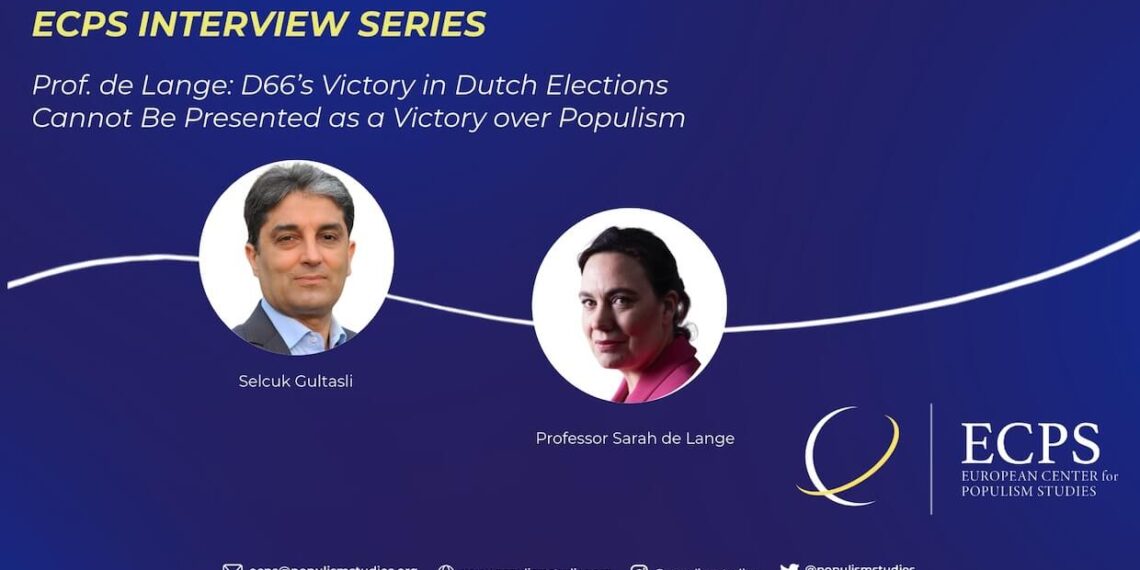In an in-depth interview with the ECPS, Professor Sarah de Lange of Leiden University cautions that “D66’s victory in Dutch elections cannot be presented as a victory over populism.” While the liberal centrist D66 led by Rob Jetten revitalized the political center, Professor de Lange stresses that “the total size of the radical right-wing bloc has not diminished—it’s just more fragmented.” She argues that Dutch politics is shaped less by populism than by nativism, which has “seeped so much into the mainstream.” Despite the PVV’s exclusion from government, Professor de Lange warns that illiberalism remains a significant threat, while the defense of liberal democracy has only recently become “more salient for mainstream parties and more visible to citizens.”
Interview by Selcuk Gultasli
In a wide-ranging interview with the European Center for Populism Studies (ECPS), Sarah de Lange, Professor of Dutch Politics at Leiden University’s Institute for Political Science, offers a sharp and nuanced interpretation of the 2024 Dutch elections, warning that “D66’s victory in Dutch elections cannot be presented as a victory over populism.” While the liberal centrist D66 emerged as the largest party, Professor de Lange argues that this outcome reflects both a revival of the political center and the continuing normalization of populist discourse within Dutch democracy.
According to Professor de Lange, the election results underscore a complex duality: “We can conclude that both things are happening at the same time.” Although centrist and Christian Democratic parties gained ground, the radical right bloc remains as strong as before—only more fragmented. This persistence, she notes, illustrates not the decline of populism but its adaptation: “The total size of the radical right-wing bloc has not diminished; it’s as strong as it was in the 2023 elections—it’s just more fragmented.”
Professor de Lange cautions against the view that the PVV’s losses signal a populist retreat. Instead, she interprets them through “traditional political science theories about governing and negative incumbency effects.” Geert Wilders’ participation in government, she explains, produced electoral backlash, but his influence on mainstream parties remains unmistakable—particularly regarding migration and national identity, now central themes even for the conservative-liberal VVD. “The VVD moved so close to the PVV in the campaign that it even supported some proposals by the radical right that had anti-constitutional implications,” she observes, underlining how populist narratives have reshaped the Dutch mainstream.
What truly defines this political transformation, Professor de Lange insists, is not merely populism but nativism. “It is this nativism that has seeped so much into the mainstream, rather than the populism,” she explains, pointing to the xenophobic nationalism that has become a structural feature of Dutch political discourse.
Reflecting on the broader European context, Professor de Lange rejects the notion that populism has been “domesticated.” Despite Wilders’ exclusion from coalition talks, she warns that illiberalism remains deeply entrenched. “There is still clearly a threat of illiberalism,” she notes, citing violent demonstrations and political intimidation during the campaign. Yet, she also detects a countermovement: “Defending liberal democracy and the rule of law has become more salient for mainstream parties… making citizens more aware of how vulnerable liberal democracy actually is.”
Ultimately, Professor de Lange’s analysis situates the Dutch case within the wider European struggle between liberal resilience and populist endurance, emphasizing that the current equilibrium represents neither populism’s decline nor liberalism’s triumph—but rather, a tense coexistence shaping the future of democratic politics in Europe.
Here is the edited transcript of our interview with Professor Sarah de Lange, slightly revised for clarity and flow.


